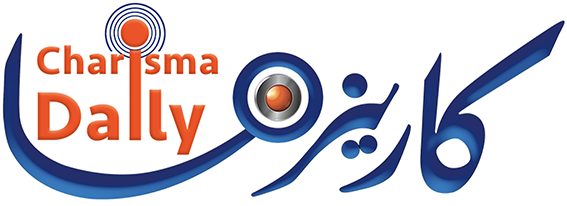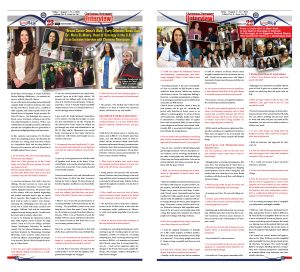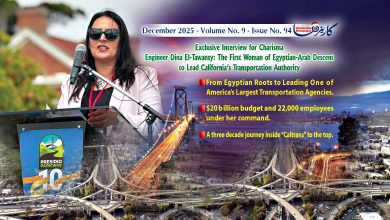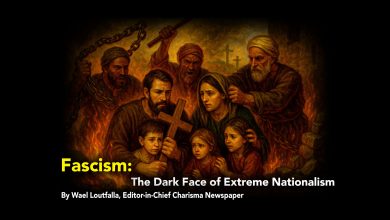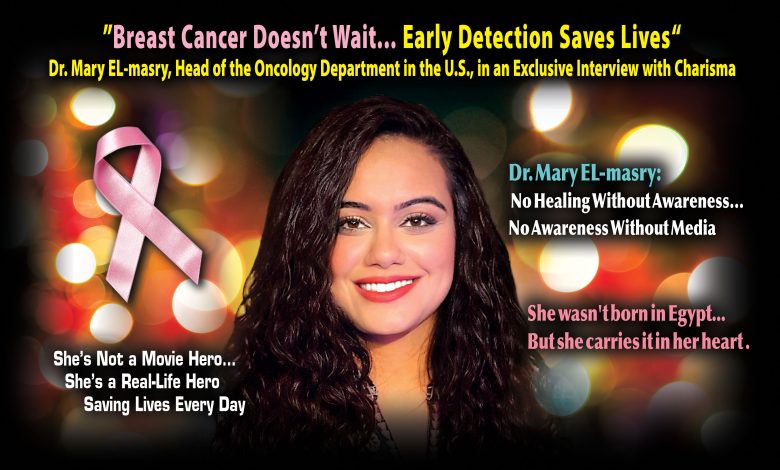
In the Heart of Oncology: A Coptic American Doctor Making a Difference .. An exclusive interview with Dr. Mary EL-Masry.
In one of the most demanding and emotionally complex fields of modern medicine, the name Dr. Mary EL-Masry stands out as a symbol of skill, empathy, and cultural pride. Born in the United States to Egyptian Coptic parents, Dr. Mary EL-Masry has dedicated her career to breast cancer treatment, working at one of the top ranked hospitals in America. With a rare combination of scientific precision and human warmth, she exemplifies the new generation of physicians bridging heritage and innovation.
In this exclusive conversation, Dr. EL-Masry shares her inspiring journey, the obstacles she overcame as a young Arab-American woman in a competitive field, and her deep belief in the power of awareness and early detection in the fight against breast cancer.
1. Dr. EL-Masry, tell us about your upbringing. Do you have any siblings?
What was it like growing up in the United States, and when did your passion for medicine begin to form?
Did your family influence your decision to pursue this path? Please share with us your first academic steps into the world of medicine.
• I was born in Queens, New York. I have two siblings. My dad was born in Cairo and my mom was born in Alexandria. I am a first generation Egyptian-American. My parents came to this country with very humble beginnings and worked extremely hard to give us a good life in America. They taught me the value of hard work in order to achieve your dreams. Choosing the challenging route does pay off in life, but it comes with many sacrifices and struggles. Without God and the tremendous support from my loving parents, I would never have been able to achieve what I did.
I went to St. Nicholas for elementary school, then Faith Baptist and El Camino for high school. I went to UCLA for college, and then George Washington University for medical school, USC for Internal Medicine residency, and then Stanford for Hematology-Oncology fellowship. I now work for Cedars Sinai Cancer Beverly Hills as a hematologist-oncologist. I am also the Clinical Chief of Medical Oncology at Cedars Sinai.
2. How has your Coptic background and cultural identity shaped your journey as a medical professional?
• I am very closely bonded to my Coptic background. I grew up in the Coptic church . My parents sent my siblings and I to the deacons class at St. Mark to learn the hymns. I truly enjoyed this. I went to Sunday School and Bible studies and now serve as a Sunday School servant for the high school students.
I also coach the Youth Spiritual Competition every summer. Serving has brought so much joy and contentment in my life. Praying for the intercession of the saints has helped me get through any trials and tribulations in my life. St. Mary and St. Athanasius is my second home. Growing up in the Coptic church has bonded me with Christ and brought me joy, comfort, and peace.
3. As someone born and raised in the U.S., how have you remained connected to your Egyptian roots and the cultural traditions of your heritage?
• I grew up in an Egyptian home with the smell of Egyptian food always in the house. I have visited Egypt and seen the amazing culture my country has to provide. I also remain bonded to my family in Egypt.
I have learned about Cairo and Alexandria and had the chance to delve into their sweetness, during my visits to Egypt. We have always adhered to Egyptian traditions in my household.
4. At what point did you feel that medicine was your true calling? And what drew you specifically to the field of breast cancer treatment?
• When I was 8 years old, my dad took me to see my grandfather in the funeral home for the viewing . My grandfather passed away from lung disease. From that point, I knew I had to be a dr to help save people from these illnesses/diseases. When I was at Stanford, I loved the biology of breast cancer and the fact that there is so much research in this field and we can save so many patients early on.
There are so many advancements in this field all the time, and I love the science behind this.
5. Have you encountered any particular challenges as a young physician of Arab descent working in the American medical system?
• I do feel that I have been welcomed in the medical field. I do not feel my Egyptian background has brought any struggles.
6. Who has been the most inspiring figure or role model in your personal and professional life?
• My parents, who hustled and worked and studied so so hard to achieve the American dream, will always be my role models.
Specialized & Medical Questions:
1. In your expert opinion, is breast cancer primarily hereditary, or is it more influenced by genetic mutations, lifestyle factors, and gender?
• Risk factors for breast cancer: 1. Genetic mutation, such as BRCA 1 or 2, females more than males, race and ethnicity (more in white females), obesity, hormones (birth control pills, hormone replacement therapy), postmenopausal females more than premenopausal females, early menarche, late menopause, strong family history of breast cancer, personal history of breast cancer, alcohol, smoking.
2. What types of patient cases tend to leave the strongest emotional impact on you in your daily work with breast cancer patients?
• Young patients who present with metastatic disease. Patients who refuse therapy at an early stage and then refuse treatment and come back as metastatic/advanced stage. Patients with no support throughout treatment, I do my best to support them.
3. How would you assess the level of breast cancer awareness among women in the United States compared to those in the Arab world?
• I do feel breast cancer awareness is definitely more in the US than in the Arab world, due to campaigns, walks, conferences etc, However, with social media hopefully it has become better.
4. What are the key factors that contribute to the early detection of breast cancer?
• Getting your screening mammograms yearly starting at age 40. Usually, people do not have symptoms. Usually it is found on a screening mammogram, Start screening before age 40 if you have a BCRA1 or 2 mutation or increased risk if breast cancer due to strong family history etc. Look out for suspicious signs: any changes in the breast: breast mass, nipple discharge, skin changes, axillary adenopathy, or other breast changes.
5. Could you explain the differences between self-examination, mammography, and ultrasound imaging? When is each method most recommended?
• Screening mammo is the most recommended. You can consider an MRI breasts or ultrasound for dense breasts (which may increase risk of breast cancer). If a suspicious finding is found on a screening mammogram, a diagnostic mammogram and ultrasound would be done and maybe an MRI breasts.
Clinical breast examination, which is done by your primary care dr, gyn etc, modestly improves early detection of breast cancer as an adjunct to mammography. In terms of breast self-examination, multiple studies have failed to demonstrate a beneficial effect of regular breast self-examination (BSE) on rates of breast cancer diagnosis and breast cancer death. Additionally, BSE is associated with higher rates of breast biopsy for benign disease.
6. Do you believe that psychological well-being plays a role in treatment outcomes? How do you approach the emotional needs of your patients?
• Yes, for sure. A positive attitude helps people get through treatment. We have therapists, social workers, and an oncology psychiatrist in the office. Some people may need talk therapy. Others may need some medication. I also am an eternal optimist and always encourage the patients with the grace of God.
7. What are the most promising new developments or innovations in breast cancer treatment today?
• There are multiple treatments for breast cancer (for those with hormone receptor positive, triple negative, and HER 2positive breast cancer). People can go many years with Stage 4 (metastatic) breast cancer. Immunotherapy has been excellent for triple negative breast cancer. Oral chemo (CDk 4/6 inhibitors) combined with anti-estrogen therapy ahs been a game changer for Stage 4 hormone receptor positive breast cancer. Molecular testing to find targetable mutations in the pt’s cancer and treating them with a drug that targets this mutation has allowed people to live longer with Stage 4 disease.
8. How do you approach late-stage or advanced cases where diagnosis was delayed?
• I look for targeted treatments. It depends if I is ER+, triple negative, or HER 2 positive. There are many many treatments now for Stage 4, as above in7. I try to keep people away from iV chemo as long as possible and focus on oral chemo etc.
9. In your view, is breast cancer a fully curable disease with today’s medical advancements?
• Usually, we do not say cure but in remission or with no evidence of disease. Breast cancer is highly treatable and a lot of patients do very well. People can go many years with Stage 4 (metastatic) breast cancer because of all the new advancements.
10. Are current treatment protocols significantly more effective than those of the past, thanks to scientific progress and increased research?
• Yes because we focus on targeted treatments. It is all about personalized medicine.
11. Based on your medical experience, to what extent can hormonal treatments such as birth control pills or fertility therapies like IVF be considered major risk factors for breast cancer in women? And is there strong scientific evidence supporting this correlation?
• Birth control and hormone replacement therapy after menopause are significant risk factors. There does not appear to be an increased risk of breast cancer in women treated with fertility drugs.
Awareness and Humanitarian Questions:
1.In your experience, what are the most common mistakes women make when it comes to their health?
• Skippjng their screening mammograms; this saves lives. Not alerting the dr when there is something wrong (breast changes etc). Skipping annual primary care dr visits. Letting fear and anxiety take over when there is an issue. Better to address with the dr early then catch things at advanced stages.
2. What message would you give to women who are afraid of undergoing early screening?
Screening saves lives. We can catch things early.
3. Is there a proven link between lifestyle choices such as diet, exercise, and stress and the risk of developing breast cancer?
• Smoking and alcohol and obesity can increase risk. Mediterranean diet is the best diet to prevent recurrence of breast cancer. Exercise reduces recurrence risk. (150 minutes to 175 minutes a week).
4. How do you view the role of media and community efforts in promoting women’s health awareness?
• Very beneficial. It raises awareness.
5. Are you personally involved in any outreach programs or community-based initiatives outside the hospital setting?
• I do walks etc. I have given community talks.
Closing Questions & Aspirations:
1. What is your ultimate dream or long-term goal in this field?
• Helping save as many lives as possible with the grace of God. It gives me so much joy to know people are achieving their life goals with my help.
2.What message would you like to share with ambitious Arab girls, both in the U.S. and around the world?
• Do not let anyone discourage you from achieving your dreams. Pray and ask God for His help. You can achieve anything you put your mind to. Work and study and pray: my motto in life. Sometimes you may need to make sacrifices to achieve your goals.
3. If you could change one thing about the healthcare system, what would it be to make it more just and inclusive?
• Work on insurance and approvals for tests, scans etc.
4. If you were offered the opportunity to return and work in Egypt or the Arab world, would you consider it? Why or why not?
• No, I would not because I grew up here12 America is my home.
5. In one word, what does medicine mean to you?
• Hope.
6. How do you perceive Charisma Newspaper and the level of engagement it receives from Egyptian and Arab readers? In your opinion, do you believe the content it offers is valuable to the Egyptian and Arab communities, particularly as a publication dedicated to serving immigrants in the United States?
• It’s an amazing newspaper that is insightful, very informative, and highly valuable.
